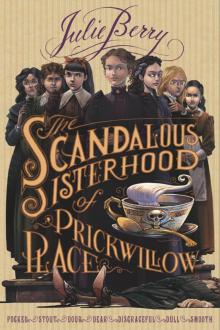- Home
- Julie Berry
The Scandalous Sisterhood of Prickwillow Place
The Scandalous Sisterhood of Prickwillow Place Read online
The author and publisher have provided this e-book to you for your personal use only. You may not make this e-book publicly available in any way. Copyright infringement is against the law. If you believe the copy of this e-book you are reading infringes on the author’s copyright, please notify the publisher at: us.macmillanusa.com/piracy.
For my own scandalous sisters, Sue, Jane, Beth, Sal, and Joanna, and all the sisters I’ve gained along the way
CONTENTS
Title Page
Copyright Notice
Dedication
Presenting the Students at St. Etheldreda’s School for Young Ladies
Persons Whom You Will Not Meet in This Narrative
England 1890
Chapter 1
Chapter 2
Chapter 3
Chapter 4
Chapter 5
Chapter 6
Chapter 7
Chapter 8
Chapter 9
Chapter 10
Chapter 11
Chapter 12
Chapter 13
Chapter 14
Chapter 15
Chapter 16
Chapter 17
Chapter 18
Chapter 19
Chapter 20
Chapter 21
Chapter 22
Chapter 23
Chapter 24
Chapter 25
Chapter 26
Chapter 27
Chapter 28
Chapter 29
Chapter 30
Epilogue
Author’s Note
Acknowledgments
Copyright
Persons Whom You Will Not Meet in This Narrative
RELATIONS AND ACQUAINTANCES
OF THE AFOREMENTIONED YOUNG LADIES
* * *
MRS. MAYBELLE PRATLEY, whose first act upon marrying Benson Pratley was to enroll his daughter, Roberta, at Saint Etheldreda’s School for Young Ladies in Ely, Cambridgeshire, forty miles from home. Mrs. Pratley believed firmly that a maiden so tall and gangly, who was always tripping over her long feet, and possessing such a weak brain, needed intensive molding into young womanhood. The late Mrs. Pratley’s indulgent parenting had left Roberta soft, but the new Mrs. Pratley aimed to correct this. Saint Etheldreda’s School’s reputation for stern discipline and strict moral guidance satisfied Mrs. Pratley well. Never mind that anyone else who knew Dear Roberta could only describe her as adorably gentle and kind; Stepmother knew best.
MRS. LLOYD MARSHALL, mother of Mary Jane Marshall, whose greatest fear was that her daughter might elope much too young and make a scandalous marriage with the wrong sort of man. Disgraceful Mary Jane had ways of escaping even her mother’s strictest supervision, and young men, particularly those of the young, reckless, penniless variety, buzzed about her like flies round a honey pot. In the watchful eye of the headmistress of Saint Etheldreda’s School for Young Ladies, the anxious mother placed all her hopes.
LEROY, RUPERT, ALEXANDER, AND CHESTERFIELD BOYLE, the younger brothers of Dull Martha Boyle, who tormented her ceaselessly because it was so easy. Frogs appeared in her porridge. Mice scampered out from under her sheets. Her spectacles would go missing, time and again, only to resurface in the potato bin or the butter churn. To be fair, most boys believe their sisters are stupid. These young men were, one regrets to say, correct. At any rate, her former governess, if pressed, would concur, though she would add that Martha was a sweet, lovely girl with a gift for piano and the voice of an angel.
ISABELLE BROOKS, cousin to Alice Brooks. Isabelle ate candied nuts, fruit jellies, and petits fours from midmorning till teatime, then buttered toast with fig preserves and cheese croissants from teatime till supper. Yet with all this, and because there is no justice in the world, she never added an ounce to her slender, graceful figure and wore Paris’s latest dressmaking fashions to perfection. Their grandmamma held Isabelle up to Alice in comparison on a daily basis. The fact that Stout Alice, who tended toward poundage, managed not to hate Isabelle was a testament to her great heart and her remarkable self-control.
MR. MAXIMILIAN HEATON, prosperous mill owner in northern England, vice-chairman of the British Railway Committee, and father of Smooth Kitty Heaton. His wife died when their only child was four, leaving Mr. Heaton to anticipate no male heir to the great estate he built through his tireless industry. This was his one great sorrow. He boasted often that he’d never stood in a room with a man who was his equal at managing an enterprise. (Had he stood more often in a room with his daughter, he might have noticed a rival for his talents growing up right under his nose.) Supremely effective Mr. Heaton may have been, but not even the shareholders in his mill, who became wealthy men by aligning their financial stars with his, liked the man.
DR. MATTHEW DUDLEY, London surgeon, and paternal uncle to Louise Dudley. He was admitted to Cambridge University on a scholarship to study medicine and later trained at the University of Edinburgh in Scotland. When his young niece, Louise, contracted smallpox at age eight, he attended her night and day, leading her safely to recovery, and became her idol and mentor forever. He encouraged her interest in science, chemistry, and medicine by supplying her with books and inviting her to lectures. He claimed she’d make a great physician. In fear of this prophecy coming true, when Pocked Louise turned twelve her parents confiscated her chemistry set and sent her to Saint Etheldreda’s School to learn ladylike arts rather than medical ones.
OLD JIM CLITHEROW, grave digger, of Newark-on-Trent, Nottinghamshire. He buried the dead at his parish church for forty years, and sometimes dug them back up again, if they had wedding rings or sturdy boots or lungs and livers worth a surgeon’s silver. One night, as he loaded a recently exhumed German widower onto his cart, he found young Miss Elinor Siever watching from behind a tree. Her pale face looked ghostly in the moonlight. He thought she was an avenging angel sent to punish him for grave robbing. Old Jim’s heart nearly gave out with shock. The young woman peered over his shoulder at the corpse of Hans Marx and reached out to touch the cold gray face of the dead. Old Jim Clitherow shooed Elinor Siever away, threw Hans Marx back where he belonged, shoveled dirt over him, and ran. That night he told the barkeep at the town pub, the Bubble and Brisket. When rumor of Dour Elinor’s nightly wanderings reached the ears of Mr. and Mrs. Siever, they enrolled her at Saint Etheldreda’s School for Young Ladies in Ely faster than you can say “necromancy.”
* * *
ENGLAND 1890
CHAPTER 1
Each Sunday afternoon at Saint Etheldreda’s School for Young Ladies on Prickwillow Road in Ely, Cambridgeshire, the seven enrolled young ladies were invited by custom to join Headmistress Constance Plackett while she entertained her younger brother, Mr. Aldous Godding, at the dinner table. The privilege of watching the headmistress and her regular Sunday guest consume the veal that they, the young ladies themselves, had prepared, more than compensated for the lack of sufficient veal for all the table to share. The girls had learned to be content with buttered bread and hot beans, Sundays upon end. Such self-denial would serve them well in their future callings as wives. This was Mr. Aldous Godding’s firm belief, and his sister, the widow Mrs. Plackett, with years of matrimonial experience behind her, could only agree.
On one particular Sunday evening in May, midway through the meal, Mrs. Plackett sopped her plate with her bread, took a bite of it, and let the morsel fall to the floor, whilst her head lolled back upon her shoulders, and her eyes gazed blankly at the ceiling. She shuddered. She shook. She let out a choking cough, then fell silent.
“What’s the matter, Connie?” her brother demanded between mouthfuls. “Speak up, wo
man. It isn’t decent goggling about like that. Pass the pepper, Missy.” This he addressed to Disgraceful Mary Jane, who sat nearest to him, but he neither knew her name nor the source of her disgrace. All the young ladies were “Missy” to him.
Disgraceful Mary Jane passed the pepper. Mr. Godding used it liberally, ate a bite of veal, laid down his knife and fork, touched his beard with his napkin, and rose from his seat. He made his way around the table to where his sister sat, raised his arm to thump her back, then choked, clutched his throat, fell forward, and landed on the floor with a thud that reverberated up the legs of the chairs upon which the seven young ladies sat.
“Dead, I imagine,” Dour Elinor observed.
Smooth Kitty slipped from her chair and went softly to the headmistress’s side. She plucked the spectacles off Dull Martha’s nose, polished them on her sleeve, then held them in front of Mrs. Plackett’s limp mouth. She watched and listened closely. The other girls hung poised for the verdict, their forks frozen in mid-bite.
Smooth Kitty, satisfied that no breath had fogged the glasses, nodded and placed them back on Dull Martha’s nose. “Dead as a kipper,” she pronounced.
“Eugh,” Dull Martha sputtered. “You made a dead person breathe on my glasses!”
Pocked Louise opened her mouth to correct Dull Martha, but Smooth Kitty shook her head slightly. Pocked Louise, the youngest of the girls, was accustomed to her older schoolmates bossing her. She kept still.
Dear Roberta covered her face with her hands. “But this is awful! Hadn’t we ought to call Doctor Snelling?”
“Bit late for that,” Dour Elinor responded. “Louise. Check the other one.”
Pocked Louise, the resident scientist, approached the fallen form of Mr. Aldous Godding cautiously. As his face was mashed against the floor, it became clear to her that she must touch him in order to turn him over, a thought which wrinkled her pox-scarred nose into a fright of disgust.
“Go on,” Dour Elinor urged. “He won’t bite.”
“But he’s a man,” Pocked Louise protested. “And such a greasy one.”
“Don’t be a ninny. Of course he’s a man,” snorted Disgraceful Mary Jane. “Believe me, there are many far better.”
“Think of him as a specimen in a jar,” Smooth Kitty said, “specially killed for the purpose of examination.”
Dear Roberta dabbed her eyes with a handkerchief. “Killed?” she squeaked. “Did you say killed?”
Pocked Louise by this point had managed to upturn her specimen and proclaim him dead. The gush of blood from his broken nose spread a ghastly crimson all over his already unpleasant face, and threatened to eternally stain the Persian rug. The girls gathered round in a circle, leaning over the body.
“Killed,” Dour Elinor said. “Murdered.” She savored the R’s in her pronunciation: murrrrderrrred.
“Oh. Oh my,” Dear Roberta began to gasp. “A murder. Oh dear. I think I shall faint.” She fluttered her hand before her face.
“Not now, Roberta, there’s a dear,” interjected Mary Jane. “Why bother swooning when there are no young men about to see you do it?”
“Balderdash,” Pocked Louise snorted. “If I wanted to faint, which I wouldn’t, I’d go right ahead and do it. I wouldn’t give tuppence for whether or not there were males present.”
“Sturdy stuff, Louise,” said Stout Alice. “To thine own self be true. Now, if we can return to the matter at hand…”
“At foot, you mean,” Dull Martha said, glancing at the corpse on the carpet.
“Something has killed Mrs. Plackett and Mr. Godding.” Stout Alice dabbed at the blood spot on the rug with her napkin. “But it may have been a mere piece of meat lodged in the throat. We mustn’t run away with ourselves with this talk of murder.”
“The odds of both of them accidentally choking within seconds of each other seem infinitesimally small,” sniffed Pocked Louise. “The facts suggest poison, which clearly points to murder. Someone murdered them.”
An angelic smile spread across Smooth Kitty’s pretty face. “Ah,” she said, “but the question is, who?”
Silence hung over the dining room. The glass-domed clock on the mantel ticked. Flowered chintz curtains swam in the sweet May breeze. Mrs. Constance Plackett sat forever straight and slack-jawed in her dining chair as seven young ladies each looked at the others as though seeing them for the first time.
“Surely it couldn’t have been one of us,” Dear Roberta sniffled.
“Why not?” said Disgraceful Mary Jane. “I say hurrah if it was one of us. Finally someone showed some good sense and got rid of those two.”
Dear Roberta’s eyes filled with tears. “But that would be dreadful! How could we go on living here, wondering which one of us was a poisoner?”
“Grab his feet, won’t you, dear?” Stout Alice addressed Dull Martha, and bent to lace her arms underneath Mr. Godding’s, which seemed now to be made of cement. Dull Martha complied, and the other young ladies pitched in, shifting and sharing the weight as best they could, taking special care to keep blood off their dresses. Together they hoisted their dead headmistress’s dead brother up into the air.
“Now what do we do with him?” asked Disgraceful Mary Jane. “Dump him on the sofa until the constables arrive? I suppose we’d better send someone to fetch them.” This thought seemed to please her. “Say, I’ll go. There’s a new constable up from London who’s ever so tall, with such lovely square shoulders, and the most adorable little gap between his front teeth. I’ll just get my new shawl…”
“Hold a moment,” Smooth Kitty said. “Before we run off flirting with constables and calling physicians, I say we think carefully. Dear Roberta has asked a very sensible question.”
Dear Roberta blinked. “I have?”
Stout Alice shifted Mr. Godding’s torso uncomfortably. “Do you mind if we have our little chat after we’ve put Mr. Godding down somewhere?”
“Oh, just drop him there where he is,” said Smooth Kitty. “He’s beyond help now.”
For the second time in minutes, Mr. Godding crashed to the floor.
“Bother,” Stout Alice said. “Now we’ll just have to hoist him up again.”
“As I was saying,” Smooth Kitty began, then paused. “Oh! Check his pockets, will you, Louise?”
“Why?”
Kitty shrugged. “If he’s got any money, we’ll have better use for it than he will.”
“Like the Achaeans in the Trojan war,” murmured Dour Elinor, with a strange light in her eyes, “stripping armor off the bodies of their fallen enemies.”
Smooth Kitty coughed. “Yes. Well. Something like that.”
“I still don’t see why I have to do all the dirty work,” grumbled Pocked Louise.
“Because you’re the youngest, and we say so,” said Disgraceful Mary Jane, earning a kick in the heel from Stout Alice.
“Because you’re so thorough, dear,” said Smooth Kitty.
Pocked Louise grimaced as she reached two fingers gingerly into each of Mr. Godding’s trouser pockets. Her search yielded a cigar, a snuffbox, a coin, a key, and a folded bit of scribbled paper.
“Is it a note?” asked Alice, peering at the scrap. “Does it mean something?”
Louise frowned. “More like an inkblot,” she said. “Perhaps a triangle. Nothing of interest here.” She dropped the items on a table.
“You don’t call a sovereign a thing of interest?” Smooth Kitty, ever one for figures and ledgers, nabbed the coin, then reported on their headmistress’s pockets. “Mrs. Plackett has a sovereign, a few shillings and pence, a handkerchief, and mint pastilles.”
“Would to heaven she’d used the pastilles more often,” said Disgraceful Mary Jane.
“Mary Jane!” Dear Roberta cried. “To speak so of the departed!”
“Well, she had foul breath, dead or alive,” Mary Jane replied. “Her odors won’t improve from here on out.”
Smooth Kitty gathered what change they’d found in both sets of pocke
ts and slipped it into her own. Then she gathered the other small items and dropped them into a small crockery urn on the sideboard.
“As I was saying.” Kitty resumed her original query with a touch of exasperation in her voice. “What Roberta so wisely asked, several moments ago, was, ‘How shall we go on living here?’ She has a point. Once we notify constables and so forth, we’ll all be sent home.”
“Of course we’ll be sent home,” Dear Roberta said. “It’s the only logical thing.” She sighed. “I suppose I must learn to love Stepmother somehow. It was so much easier here when I didn’t have to look at her. It made it much easier to pray for her, as the vicar said we must do for all our enemies.”
“But why, Roberta dear?” Dull Martha said. “Why should you go home to your nasty stepmother? Can’t we stay here, and we’ll all just go on like we do?”
“They won’t let us,” Pocked Louise protested.
“Who’s they?” Dull Martha asked.
“Coroners,” Dour Elinor intoned. “Undertakers. Police. School overseers. All the people who’ll descend upon us like a flock of ravens once it’s known that these two are dead.”
“You sound almost glad of their coming, Elinor,” Smooth Kitty observed.
“Only the undertakers,” Elinor admitted. “I’ve always wanted to witness an embalming.”
“Bother and more bother.” Disgraceful Mary Jane flopped back into her chair at the dinner table. “With those two nuisances gone, we might actually have had some fun. This whole place is suddenly much more interesting. And now we shall have to leave it.”
“And each other,” Pocked Louise added.
Stout Alice put an arm around Pocked Louise. Louise rested her head on Alice’s shoulder.
“I don’t want to go home, either,” Dull Martha said. “My little brothers torment me so. They pull my hair and stick it in ink, and paste my piano pages together.”
“Mother won’t let me out of her sight for a minute,” Disgraceful Mary Jane said. “She swears I’ll elope if she leaves me unguarded for half an hour. I ask you, have you ever heard such rubbish?” She grinned. “Ten minutes and a willing man are all I’d need.”

 The Amaranth Enchantment
The Amaranth Enchantment Secondhand Charm
Secondhand Charm All the Truth That's in Me
All the Truth That's in Me Lovely War
Lovely War The Emperor's Ostrich
The Emperor's Ostrich The Passion of Dolssa
The Passion of Dolssa Wishes and Wellingtons
Wishes and Wellingtons The Scandalous Sisterhood of Prickwillow Place
The Scandalous Sisterhood of Prickwillow Place Amaranth Enchantment
Amaranth Enchantment